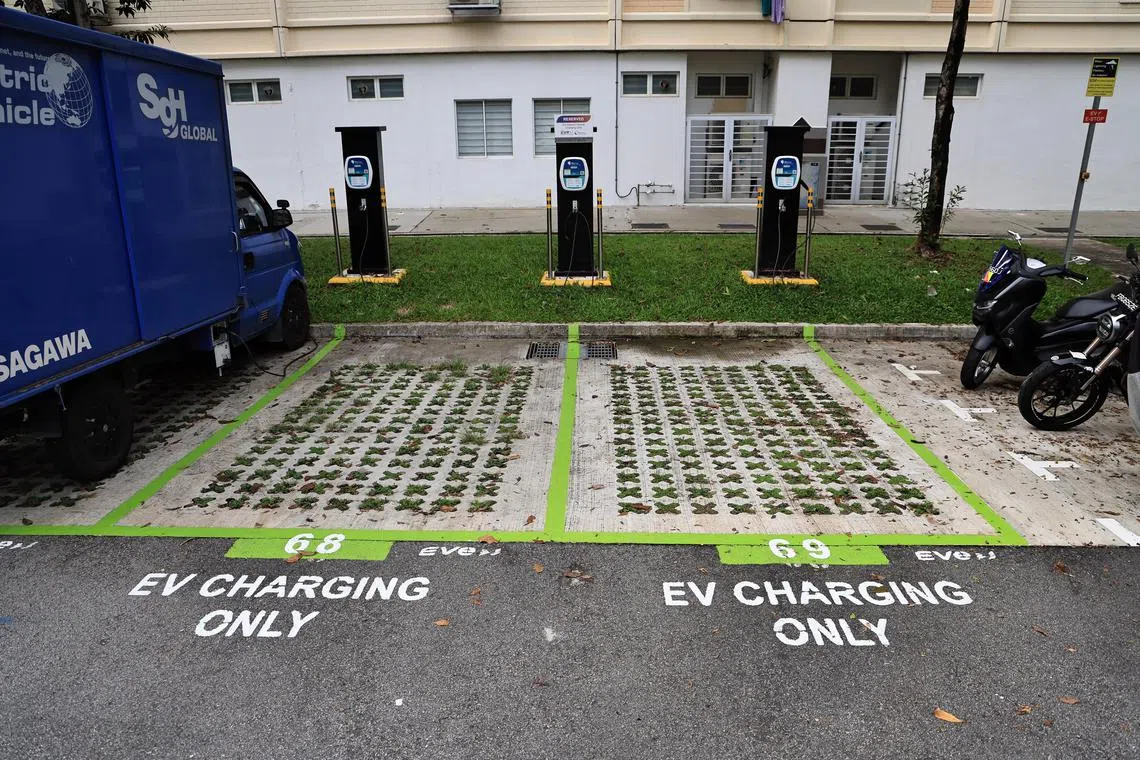Budget 2025: Incentives to boost adoption of electric heavy vehicles, installation of fast chargers
Sign up now: Get ST's newsletters delivered to your inbox

The electric vehicle incentive schemes announced on Feb 18 are aimed at speeding up the adoption of clean heavy vehicles.
ST PHOTO: KELVIN CHNG
Follow topic:
SINGAPORE - Owners of heavy goods vehicles and buses will be given incentives to switch to electric models as part of the Government’s latest push to reduce planet-warming carbon emissions generated by the transport sector.
The authorities will provide partial funding for the installation of related charging infrastructure via a new grant, Prime Minister Lawrence Wong announced in his Budget speech
The Government will also continue studying how Singapore’s rail network can be expanded, PM Wong said, without elaborating. “Alongside electrification, increasing the use of mass public transport is central to reducing emissions,” he added.
The electric vehicle incentive schemes announced on Feb 18 are aimed at speeding up the adoption of clean heavy vehicles, which has been slower than for other electric vehicle types, said PM Wong, who is also Finance Minister.
To partly make up for the loss of fuel excise duties, which contribute around $1 billion a year to the public purse, the road tax payable for electric heavy vehicles and electric buses will be raised in tandem.
A flat tax component that is already in place for electric cars and light goods vehicles
To be phased in over three years from January 2026 and rolled out in full from January 2028, this “additional flat component”, or AFC, will be set at $250 per year for electric heavy goods vehicles, $190 a year for electric mini-buses, and $550 per year for large electric buses.
In his Budget speech, PM Wong noted that the transport sector accounts for about 15 per cent of Singapore’s total emissions today.
According to National Climate Change Secretariat data, this is an increase from the levels recorded in 2022, when transport contributed to 12 per cent of Singapore’s primary emissions.
PM Wong reiterated Singapore’s aim of having all vehicles here run on cleaner energy by 2040. This includes both electric and hybrid models.
He said the Republic is making good progress towards this target, pointing to the fact that a third of all new cars registered here in 2024 were fully electric, and almost half were hybrids.
But he noted that for heavy vehicles, the switch to cleaner-energy variants has been stymied by limited model availability, higher upfront costs and less accessible charging infrastructure.
Hence, a new Heavy Vehicle Zero Emissions Scheme will incentivise the purchase of battery-powered heavy vehicles, while a new Electric Heavy Vehicle Charger Grant will provide co-funding for the fast chargers that are needed.
More details will be made public at the debate on the Transport Ministry’s budget.
Based on Land Transport Authority (LTA) statistics, 466 – or about 8 per cent – of the 5,736 new heavy goods vehicles and buses registered in 2024 were fully electric.
On the need for an additional flat tax on electric heavy vehicles, PM Wong said drivers of internal combustion engine (ICE) vehicles have to pay fuel duties, which serve as a form of usage charge.
As the Government is still considering how to design a usage-charge mechanism for cleaner-energy vehicles, the AFC is an interim measure to maintain parity between drivers of ICE and electric vehicles, he added.
“EVs, while much less pollutive, should not be exempted from usage charges,” PM Wong said.
When the AFC is rolled out fully in 2028, owners of electric heavy goods vehicles – with a maximum laden weight of above 3.5 metric tonnes – will have to pay an annual road tax of between $774 and $1,032.
In comparison, the annual road tax for a diesel or diesel-hybrid equivalent is between $656 and $978, though this does not account for the fuel duties that need to be paid.
For large electric buses, the annual road tax payable from 2028 will range between $1,074 and $1,910.
In comparison, the annual road tax for a diesel or diesel-hybrid equivalent bus today is between $656 and $1,700.
On the public transport front, PM Wong said the Government is investing more than $60 billion this decade to expand and renew Singapore’s rail network. A $900 million kitty has also been set aside to improve bus services over eight years under the Bus Connectivity Enhancement Programme.
PM Wong said Singaporeans can look forward to the new Jurong Region and Cross Island MRT lines – Singapore’s seventh and eighth MRT lines – as well as extensions to the Thomson-East Coast, Downtown and Circle lines.
While there are no firm details yet, LTA said in 2019 that it was studying the feasibility of building a ninth MRT line, connecting the north and north-east regions of Singapore with the city centre.
A possible West Coast Extension is also being explored, which could link the upcoming Jurong Region Line with the Circle Line.
Mr Yoon Young Kim, cluster president for Singapore and Brunei at Schneider Electric, said the energy management company has seen growing interest in electric vehicles among its industrial clients.
The firm has 2,000 chargers deployed across the island and plans to add more.
However, he highlighted the need for the grid infrastructure here to be upgraded over time to support increased demand from electric heavy vehicles.
While there are no details yet, he expects the new Electric Heavy Vehicle Charger Grant to be key, as charging infrastructure represents a significant investment for businesses.
“Singapore has had success with its Electric Vehicle Common Charger Grant,” he said, referring to an existing funding scheme
He added: “We believe a similar co-funding model will incentivise businesses.”
Dr Deven Chhaya, infrastructure advisory partner at professional services company KPMG Singapore, said the electrification of Singapore’s heavy vehicle fleet is seldom discussed.
But it represents a “transformative opportunity”, as heavy vehicles contribute a significant share of emissions within the transport sector.
For the new incentives to be truly impactful, Dr Chhaya said they need to be in place for a sustained period to give long-term certainty to businesses, which may face challenges in adapting to new vehicle technologies.
“Prioritising commercial-vehicle electrification can drive rapid advancements in infrastructure and battery technology... This progress will, in turn, lower costs for consumers,” he added.
Mr Eddison Lee, a Singapore-based principal at consultancy Oliver Wyman who focuses on energy and natural resources, said the higher road tax for electric heavy vehicles should not materially impact adoption.
“Commercial fleet vehicles tend to have higher mileage, thus switching to EVs will be beneficial as fuel cost savings will still outweigh the higher road taxes,” he said.


